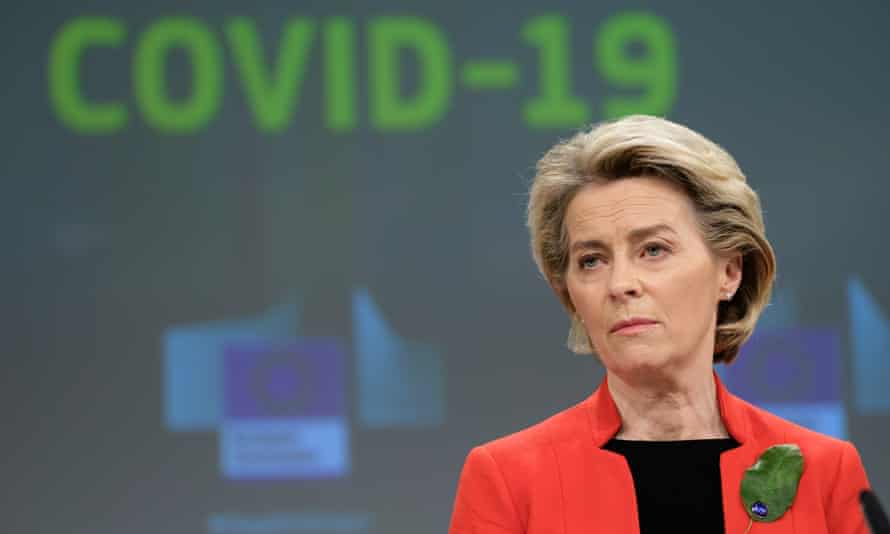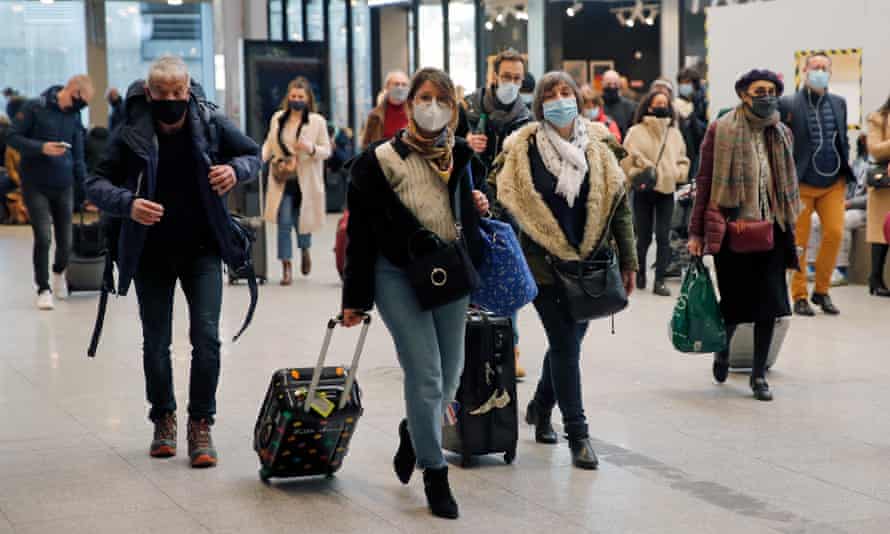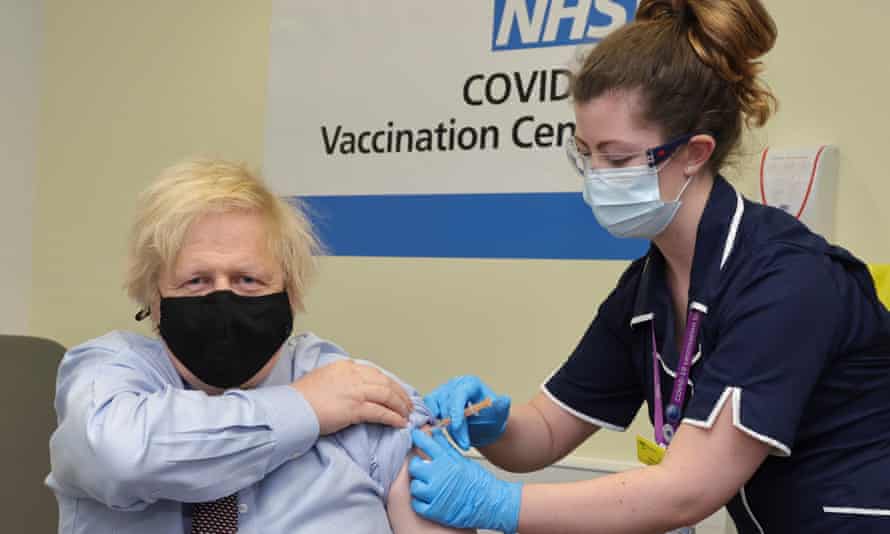For Stacey Harris, the hardest part of organising vaccinations over the last couple of months has been fending off patients. “They’d be ringing up, coming into the surgery saying ‘I want my vaccine,’” she told the Observer.
But last week that popularity evaporated. On Thursday, Harris – a healthcare assistant receptionist at the Faversham Medical Practice in Kent – found she could no longer find enough people willing to come in for their jabs.
“They want to know what vaccine they will be given,” Harris said. “And when you say it’s the AstraZeneca, they say: ‘I’ll wait for the next one’. It’s become an absolute headache.”
It is a story being repeated across the nation in the wake of last week’s decisions by European nations to suspend the use of Oxford/AstraZeneca jabs over worries they could cause blood clots. Just as Britain seemed ready to ease out of lockdown, the very vehicle of our release – our massive vaccination programme – has been beset by crisis.
Nor is this the only threat to the vaccination plan. It faces a second menace, also with its roots in Europe, in the form of commission president Ursula von der Leyen’s warning that the EU may halt vaccine exports to nations failing to show reciprocity by allowing supplies to reach the bloc. Nor did she disguise the fact that the UK would be a prime target for such a ban.
For good measure, it was also revealed last week that the UK was facing a shortfall in vaccine supplies from India – about 5 million jabs – that could delay its plans to inoculate all the nation’s adults by summer. The prospect of a return to normal life in the sunshine suddenly looked more remote last week – just as a weary nation prepared to mark the first anniversary of its first lockdown.
Britain faces being deprived of vaccines which, in any case, are not trusted by an increasing number of people. So just how serious is the threat to our vaccination programme? Will lack of supplies paralyse it? Or will we end up with enough vaccines but with insufficient people willing to take them?

These are important questions because vaccines are now viewed as a lifeline to a return to normality, a point that was summed up last week by Professor James Naismith, director of the Rosalind Franklin Institute in Oxford. Countries without advanced vaccine programmes were going to face a very difficult road ahead, he warned. “Vaccinations offer the only realistic hope to end the pandemic,” he added.
The threat to the reputation of the AstraZeneca jab – the cheapest and easiest vaccine to distribute around the planet – is therefore an extremely serious issue and reveals the extent to which suspicion has dogged its introduction. In the wake of anecdotal reports of side-effects, French president Emmanuel Macron called it “quasi-ineffective” in the elderly in January, before recanting, while Germany’s chancellor Angela Merkel admitted it had an acceptance problem in her country.
Earlier this month, Austria and Italy withdrew batches after cases of adverse reactions were reported. Then, on Monday, German health authorities revealed they had found a small number of cases of women suffering blood clots after being given the AstraZeneca vaccine. Berlin ordered a halt to its use, to be followed by France, Italy, Spain and several other nations.
Many of these countries have since restarted using the vaccine, after the European regulator announced on Thursday it could find no causal link between it and blood clots – though Norway, Denmark and Sweden are still suspending it, while France has decreed it will only give it to those aged over 55 (odd given Macron’s previous questioning of its usefulness for the elderly).
“Any concerns about potential links between the AstraZeneca vaccine and regular blood clots can now be discarded,” said professor Gino Martini, chief scientific officer at the Royal Pharmaceutical Society. “The vaccine is playing a crucial role in protecting vulnerable groups from hospitalisation and death and helping to decrease infection rates.”

The AstraZeneca jab remains under a cloud of doubt, nevertheless – a problem that could have widespread, worrying implications. “By having a message of doubt rather than a message of reassurance, that now plays into the hands of the anti-vaxxers. They are very well organised,” said Professor Beate Kampmann, of the London School of Hygiene and Tropical Medicine.
Nothing says “lockdown” as loudly as hundreds of miles of traffic jams on all roads out of Paris and trains to the Mediterranean and Brittany full to bursting. And that was just what happened on Friday after French prime minister Jean Castex announced that the capital and 15 other departments – out of a total of 94 – would face new restrictions. By evening, traffic congestion more than 250 miles long affected roads leading from the capital. By Saturday morning, the city centre looked deserted. Covid-19’s third wave was now making itself felt.
About 21 million people – roughly a third of the French population – living in Paris and surrounding areas, as well as several departments in the north and south, are now affected. Unlike the three-month strict national lockdown that started this time last year, the measures are geographically specific and are aimed at halting the “third wave” of Covid cases that is sweeping the nation. Two-thirds of these are now the highly contagious “English variant”, that has seen admissions to hospital intensive care units soar. Worryingly, health chiefs report that many of the new patients are younger than in past Covid waves.
The measures have been imposed at the end of a perplexing week. On Monday, Macron announced France would temporarily halt AstraZeneca vaccinations as a “precautionary measure” following fears of possible side-effects. The pause lasted four days. On Thursday, Castex was back on television reassuring the sceptical French that the vaccine was safe, before rolling up his sleeve for a jab on Friday.
Such dithering is “bad, especially in France where anti-vax feeling is rife” observed one commentator, the Paris-based journalist John Lichfield. But not all the French-bashing criticism was merited, say some analysts. Medical authorities also argue that France is on track to hit its target of 10 million vaccinations by mid-April and is not – as has been claimed – “sitting on” vaccine supplies.
Professor Sir John Bell, who was involved in the development of the AstraZeneca vaccine, disagrees, however. On Saturday he accused the French of damaging people’s confidence in vaccines in general. “They are sitting on a massive stockpile of vaccines they haven’t deployed yet and at the same time they have got a massive wave of the new variants coming across the country. You couldn’t make it up,” he told BBC Radio 4’s Today programme. “If there are clotting problems associated with the vaccines – and I am not saying there are – they are at a very tiny level compared with the problems you get if you get the disease.”

The contrast between the fate of the French and other EU nations and Britain is striking. While the EU shopped for vaccines like a customer, the UK took a more direct approach and went into business with the vaccine-makers, spending much more heavily to accelerate development, testing and production. The success of this strategy has been helping the government gain a “vaccine bounce” before local elections in early May, allowing the Conservatives to open up a small lead over Labour. It had previously let a huge lead slip as it botched the handling of Covid last year.
Seasoned pollsters have been noting a recent shift in the polls towards the Conservatives among voters aged over 55 – in other words, among those who have received the jab – and have been surprised at just how fast the effect seems to have happened. Usually, a prime minister’s personal ratings recover first, followed more slowly by party support.
It has frustrated Labour, which has struggled to find a way of attacking the government’s performance without being seen as divisive in a time of national crisis. There is also frustration at the Tory attempt to brand the vaccine effort a Conservative success – Matt Hancock, the health secretary, recently tweeted the proportion of vaccinations in a message embossed with party branding.
Angela Rayner, Labour’s deputy leader, said the vaccine effort was a public sector success story, not a Tory one. “I do think there is an issue with that,” she said. “It’s not because the Conservatives have done a good job. It’s actually because our public sector workers, our NHS have utilised their existing skills and rolled it out through our local primary care services and local authorities. So I put the success back down to our scientists, first of all, our NHS and public services.”
However, there are many potential political traps for Johnson to navigate between now and early May. Dominic Cummings, the former chief adviser to the PM who left at the end of last year, is causing problems for Johnson. Last week, he accused the health department of being a “smoking ruin” in terms of parts of its Covid handling and he has re-emerged on Twitter. His demand for transparency over the government’s Covid response spells trouble for the prime minister.
Last week’s surprise slump in vaccine supplies, meaning new bookings for jabs were suspended for April, also shows how fragile the vaccine effort remains, due to the huge global demand and the complexities of its supply chain.
And there is also the potential problem, according to some pollsters, of the government becoming a victim of the vaccine’s success. The polling bounce has been so rapid, they think, that it is possible people may either begin to think about other issues – or if there are setbacks in the unlocking timetable, this could rebound heavily on the government. With senior scientists already warning about allowing foreign travel this summer, expectation management may become an issue for ministers.
It remains to be seen whether the vaccine problems that have beset Europe can be resolved and if the UK can maintain the formidable pace of its programme. Dr Gaurav Gupta, who heads the Faversham vaccination centre, said that his team had invited 140 people to book an appointment on one day last week. Only 40 accepted. “We were expecting a much bigger take-up,” he said. “At the very start, when we were calling patients, we were getting close to 100% take-up and nobody was missing their appointments.”
In fact, there were signs before last week that enthusiasm for vaccines might be waning, added Harris. “You could already notice a change,” she said. “This week was a more dramatic change though. It’s social media – everything on Facebook. Everyone wants to know ‘how did you feel, how did you feel?’ They’re worried about side-effects.” On the other hand, after conversations with patients, some respond. “I tell them I’ve had the vaccine myself,” added Harris. “People do listen. But a lot have made up their minds already.”
It is a view shared by Dr Marek Jarzembowski, a GP in south London. “All the stuff going on with Europe, and the fact that there have been delays in delivery of stock to the UK – when you start having one story after another, people start thinking – completely incorrectly – there’s no smoke without fire. But it’s very important that everyone gets vaccinated. It’s the way out of this.”
This content first appear on the guardian
